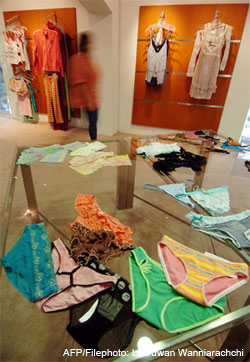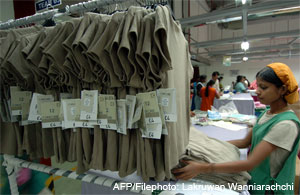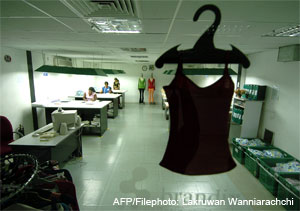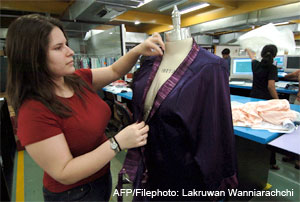Playing Tough
Vietnam, vanishing margins, wages worry Sri Lanka apparel trade in 2007
by Zainab Ibrahim, LankaBusinessOnline, January 1, 2007
|
Over 50 percent of the island's export earnings come from the 2.7 billion dollar garment industry, which has carved out a niche to turn out top quality apparel, exotic lingerie at a quick turnaround time.... Vietnam [is] counting on WTO membership for greater access into Sri Lanka's biggest market – the United States... Sri Lanka is falling behind on exports to the US, dropping one percent as of end September 2006 to 1.2 billion dollars... "This is the first time that the industry got involved in official level talks with the US. They were quite impressed with our 'Garments without Guilt' program."
|
Vietnam, vanishing margins and wages will top the list of concerns of Sri Lanka's apparel trade this year, as it counts on expanding trade ties with Europe to pull it through.
Over 50 percent of the island's export earnings come from the 2.7 billion dollar garment industry, which has carved out a niche to turn out top quality apparel, exotic lingerie at a quick turnaround time.
 Sri Lanka is the largest supplier to lingerie chain Victoria's Secret, also ships clothes to top brands like GAP, Levis, Marks & Spencer and Tesco in the United States and Europe. Sri Lanka is the largest supplier to lingerie chain Victoria's Secret, also ships clothes to top brands like GAP, Levis, Marks & Spencer and Tesco in the United States and Europe.
But from this year, as Vietnam joins the ranks of free trade countries with its entry into the World Trade Organization, Sri Lanka has a bigger fight on its hands.
When a country joins the WTO, trade restrictions between it and the rest of the world are relaxed, with Vietnam counting on WTO membership for greater access into Sri Lanka's biggest market – the United States.
"Vietnam joining the WTO will definitely be a threat to us because they compete in a majority of the same product lines as us such sports wear and casuals. They have also grown 25 percent this year, without even entering the WTO," A Sukumaran, Group Managing Director of Star Garments Limited, told LBO.
Faced with regional competition and out priced by giants like China and India, Sri Lanka is falling behind on exports to the US, dropping one percent as at end September 2006 to 1.2 billion dollars.
Sri Lanka may be able to count on trade restrictions, at least in the short term however, with the US congress throwing out legislation in November that would have normalized trade relations with Vietnam.
The legislation would have done away with quotas on imports from Vietnam, which will now remain, but would have also made anti-dumping measures against it, easier to impose.
Europe already abolished quotas on imports from Vietnam in 2004, but Sri Lanka has duty free access into Europe for its garments that it is counting on to cushion it against competition.
Bargaining Chips
 Sri Lanka is the only South Asian country to win duty free access into Europe – its second biggest market -- for its high labour standards, under the EUs Generalized System of Preferences Plus (GSP+) scheme. Sri Lanka is the only South Asian country to win duty free access into Europe – its second biggest market -- for its high labour standards, under the EUs Generalized System of Preferences Plus (GSP+) scheme.
This year, tough Rules of Origin, which specifies the level of local value addition needed to get the duty free benefits, is to be relaxed further, making more Sri Lankan exports eligible for the tax breaks.
The rules are likely to be brought down from a high 50 percent local value addition to about 35 percent, benefiting Sri Lanka, which imports bulk of its fabric for its clothes.
Sales to Europe surged 12 percent as at end September '06 to 832.7 million dollars, due to improved sales in UK, Italy, Germany and the Netherlands. "The trade deal with Europe is what we are counting on this year," Sukumaran said.
Though Sri Lanka re-opened talks on a trade deal with the US late last year, the industry is largely sceptical that anything much will come of it.
"This is the first time that the industry got involved in official level talks with the US. They were quite impressed with our 'Garments without Guilt' program," Ajith Dias, Chairman of the Joint Apparel Association Forum, told LBO in an interview.
"Come January, we are hoping to do a roadshow in the US." Sri Lanka recently launched a public relations campaign tied to ethical manufacture – no child labour and no sweatshops.
The campaign could be Sri Lanka's edge as buyers like M&S go ahead with their ethical trading 'Look Behind the Label' campaign and surveys in the UK show that 78 percent of shoppers want to know more about how their clothes are made.
But though buyers have lauded Sri Lanka for its high standards and efforts, exporters are not really expecting that it will be translated into a trade deal with the US.
"Sri Lanka is expensive, we have a war and we have child soldiers," one exporter told LBO. An escalating conflict between the government and Tamil rebels is threatening to spook buyers, with growing international criticism of the use of child soldiers in the war.
Orders in the last few months of 2006 had begun falling off, while pressure continued to mount on prices and margins.
"Order books for the last quarter of the year were very bad. For the first quarter of next year orders are getting filled up, but prices are low. Prices have dipped on average by around 10 percent since quotas were lifted in December 2004," Sukumaran said.
Last year, Marks & Spencer said it was cutting supplier payments by up to 5.5 percent, demanded better terms from its producers and dropped prices on clothes. |
Wage Battles
 Closer to home, disputes over minimum wages are threatening to snowball this year, with apparel sector trade unions agitating for a minimum monthly wage of 10,000 rupees (100 dollars) to cope with a soaring cost of living. Closer to home, disputes over minimum wages are threatening to snowball this year, with apparel sector trade unions agitating for a minimum monthly wage of 10,000 rupees (100 dollars) to cope with a soaring cost of living.
Companies however say that they already pay well over current minimum wages of 5000 rupees (50 dollars), with average pay of over 7,000 rupees and cannot afford to pay more given market conditions.
This is in addition to benefits like transport and food. Dias, who also heads an industry committee on labour relations, says that wages are higher than regional competitors like India and Bangladesh
Unions have argued that some companies violate internationally accepted wage rates, overtime hours, unfair dismissal of workers and do not allow trade unions to be formed.
Unions are also fighting for adequate compensation for laid off workers in factories that have shut down. Over 50 factories have closed down since quotas were lifted, but unofficial industry estimates say this could be much higher.
Ongoing and vocal trade union agitation could taint the island's 'Garments without Guilt' campaign, with unions arguing that the ethical trading claim is a lie if their needs are not addressed.
The industry is to also launch a 30 million-rupee campaign this year to prevent skilled workers from leaving for higher paying jobs in the Middle East and dispel a negative industry image.
Sri Lankan clothing manufacturers are short of some 32,000 skilled and unskilled workers, largely machine operators. Over 80 percent of workers in Sri Lankan factories are women, some traveling from far to work in factories in free trade zones. |
Beating the Odds
 Though Sri Lanka is expensive and despite the odds, buyers have continued to stay on, some like Victoria's Secret and Tesco even upping business from the island this year. Though Sri Lanka is expensive and despite the odds, buyers have continued to stay on, some like Victoria's Secret and Tesco even upping business from the island this year.
Large players that have survived a post-quota era are investing heavily in backward linkages, fabric, accessory and finishing plants and design capabilities.
Those are Sri Lanka's wining cards, despite even war jitters.
British retailer Tesco's buys clothes for its up-market ranges in its department stores, from about 30 Sri Lankan suppliers and expects a 40 percent spike in business from the island in 2007.
"Sri Lanka is slightly more expensive than China or India, but in Sri Lanka it is a pool of excellence for our better and best ranges. We have better fabric and design and much shorter lead times from Sri Lanka to Europe," Christophe Roussel, the group's International Sourcing and Logistics Director, said in Colombo recently.
"Sri Lanka has been getting more sophisticated each year and the emphasis Sri Lanka puts on innovation makes the difference. Labour costs aren't really the biggest variable in the equation," Jerry Stritzke, Vic Secrets Chief Operating Officer told LBO in October.
The lingerie chain has moved more business into Sri Lanka over the past two years, buying up 500 million dollars worth of bras, panties, swimwear, sleepwear and casual wear in 2005.
Local giants like MAS Holdings will operate an apparel park in Thulhiriya, investing an initial 25 million dollars to develop the zone, with new textile projects to begin this year.
MAS together with leading exporter Brandix have also moved into India for new opportunities, leveraging on India's strengths as a raw material base and to spread risk.
Brandix will operate an apparel zone in Visakhapatnam, attracting a billion dollars in investment from partners over the next five years. MAS will operate a 200 million dollar apparel park in Andhra Pradesh.
Sri Lanka will remain a hub for front-end activities like product design and development, merchandising, marketing and manufacture of value added high end products.
The Indian operations, which allows scale, will be used a production base for basic products.
Sri Lanka hopes to round out 2006 with between three to seven percent growth, touching three billion dollars at best, a growth it is hoping it can match this year, Dias says. |
|
 Home
Home Archives
Archives Sri Lanka is the largest supplier to lingerie chain Victoria's Secret, also ships clothes to top brands like GAP, Levis, Marks & Spencer and Tesco in the United States and Europe.
Sri Lanka is the largest supplier to lingerie chain Victoria's Secret, also ships clothes to top brands like GAP, Levis, Marks & Spencer and Tesco in the United States and Europe.  Sri Lanka is the only South Asian country to win duty free access into Europe – its second biggest market -- for its high labour standards, under the EUs Generalized System of Preferences Plus (GSP+) scheme.
Sri Lanka is the only South Asian country to win duty free access into Europe – its second biggest market -- for its high labour standards, under the EUs Generalized System of Preferences Plus (GSP+) scheme.  Closer to home, disputes over minimum wages are threatening to snowball this year, with apparel sector trade unions agitating for a minimum monthly wage of 10,000 rupees (100 dollars) to cope with a soaring cost of living.
Closer to home, disputes over minimum wages are threatening to snowball this year, with apparel sector trade unions agitating for a minimum monthly wage of 10,000 rupees (100 dollars) to cope with a soaring cost of living.  Though Sri Lanka is expensive and despite the odds, buyers have continued to stay on, some like Victoria's Secret and Tesco even upping business from the island this year.
Though Sri Lanka is expensive and despite the odds, buyers have continued to stay on, some like Victoria's Secret and Tesco even upping business from the island this year.